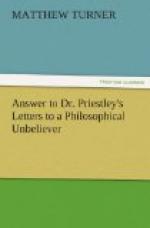The following chain of reasoning, as used by Dr. Priestley, is well linked together to prove the weight and force of experience in reasoning, but it proves nothing more. “Chairs and tables are made by men or beings of similar powers, because we see them made by men; and we cannot suppose them made by a tree or come into being of themselves, because that is against experience. No one will say one table might make another, or that one man might make another. We see nothing come into being without an adequate cause.” Yet for this adequate cause we are at the same time referred to a belief in a causeless secret invisible agent, and to our own experience, for a proof of his nature.
Dr. Priestley allows, that what is visible in man may be the feat of all his powers, for it is (as he says,) a rule in philosophy not to multiply causes without necessity. But he affirms that what is visible in the universe cannot be the feat of intelligence. This is breaking the very rule of reasoning which he himself has chosen to adopt; and he gives no other reason for it, than because we do not see the universe think as we do man. Sensible of this dilemma, soon afterwards he inclines to allow principle of thought to the universe, for he adds, that if we allow it, yet the universe has so much the appearance of other works of design that we must look out for its author as much as that of a man; and it is allowed that most probably it had the same author.
Every difficulty vanishes with the energy of nature, or at least is as well accounted for as from an independent Deity. It is an usual question to those philosophers, who maintain that the present existence of things is the result of the force and energy of nature acting upon herself, “why this force does not perpetually operate and produce new appearances?” Besides that this question may be retorted upon the supporters of a Deity, I am thoroughly persuaded, that this force is constantly in action, and that every change which animals and vegetables undergo, whether of dissolution or renovation, is a manifest and undeniable proof of it. Man, and the other Beings which occupy this terrestrial globe, are evidently suited to its present state, and an alteration in their habitation, such as that of extreme or excessive heat, would inevitably destroy them. This is so certain, that bones of animals have been dug up which appertain to no species now existing, and which must have perished from an alteration in the system of things taking place too considerable for it to endure. Whenever the globe shall come to that temperament fit for the life of that lost species, whatever energy in nature produced it originally, if even it had a beginning, will most probably be sufficient to produce it again. Is not the reparation of vegitable life the spring equally wonderful now as its first production? Yet this is a plain effect of the influence of the sun, whose absence would occasion death by a perpetual winter.




